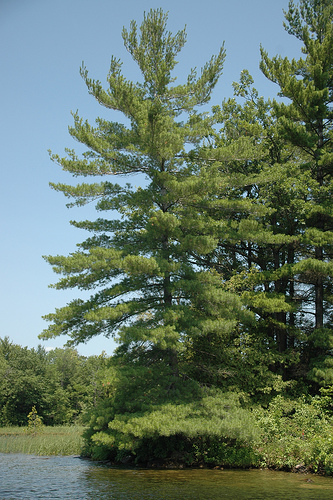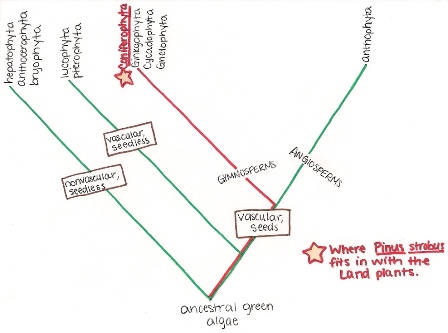
Where do they fit in, in the classification scheme?
Domain:
Eukarya because it has a true nucleus, membrane bound
organelles, and multiple,
linear chromosomes.
Kingdom:
Plantae because it contains a cellulose cell wall,
chloroplasts for photosynthesis, and is multicellular.
Phylum:
Coniferophyta because it is capable of secondary growth,
is monoecious, and has protective buds.
Class:
Pinopsida because it has small and simple leaves and
undergoes secondary growth of the root and stem.
Order:
Pinales because it has needle-shaped leaves and has a
straight trunk
with horizontal branches.
Family:
Pinaceae because it has well developed scales with seed
wings.
Genus:
Pinus because it produces its needles in bundles called
fascicles and undergo spiral
growth.
Species:
Pinus strobus translates to "coned-pine."
 The line drawing
to the left is a broad cladistic phylogenetic tree, based on
morphological features, that helps to
depict where the Eastern white pine tree fits in with the land
plants. It shows that all land plants have a common ancestor with the
green algae. Pinus strobus follows the path of the red line up to
the phylum coniferophyta. It has naked seeds, thus being in the
group, gymnosperms, and has vascular tissue of xylem and phloem.
The line drawing
to the left is a broad cladistic phylogenetic tree, based on
morphological features, that helps to
depict where the Eastern white pine tree fits in with the land
plants. It shows that all land plants have a common ancestor with the
green algae. Pinus strobus follows the path of the red line up to
the phylum coniferophyta. It has naked seeds, thus being in the
group, gymnosperms, and has vascular tissue of xylem and phloem.
The image at the right is a phylogenetic tree that shows the
different genera within the family of the pinaceae. All members of
the family pinaceae have female and male cones and needle-like
leaves. The different genera are based on morphological features,
generally having to do with needles or cones and their shape, size,
and arrangement.
Home
Next